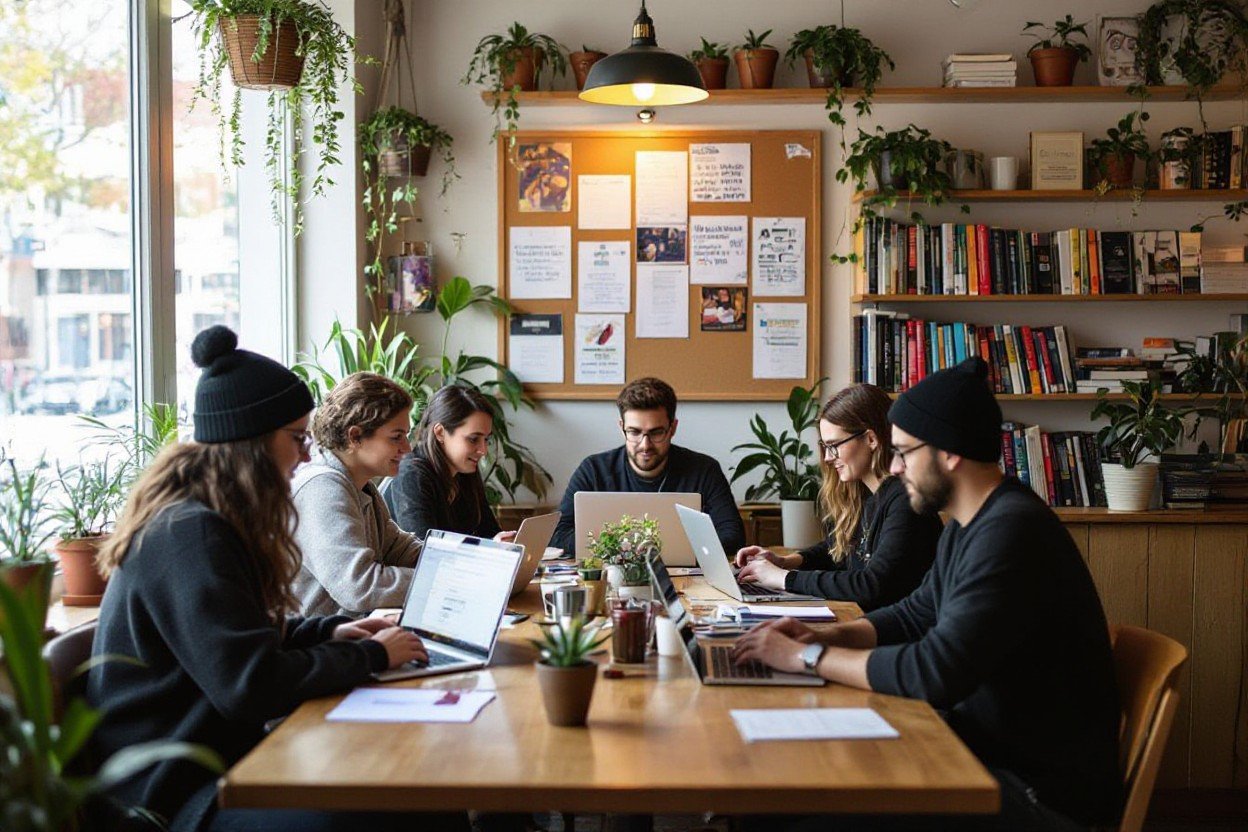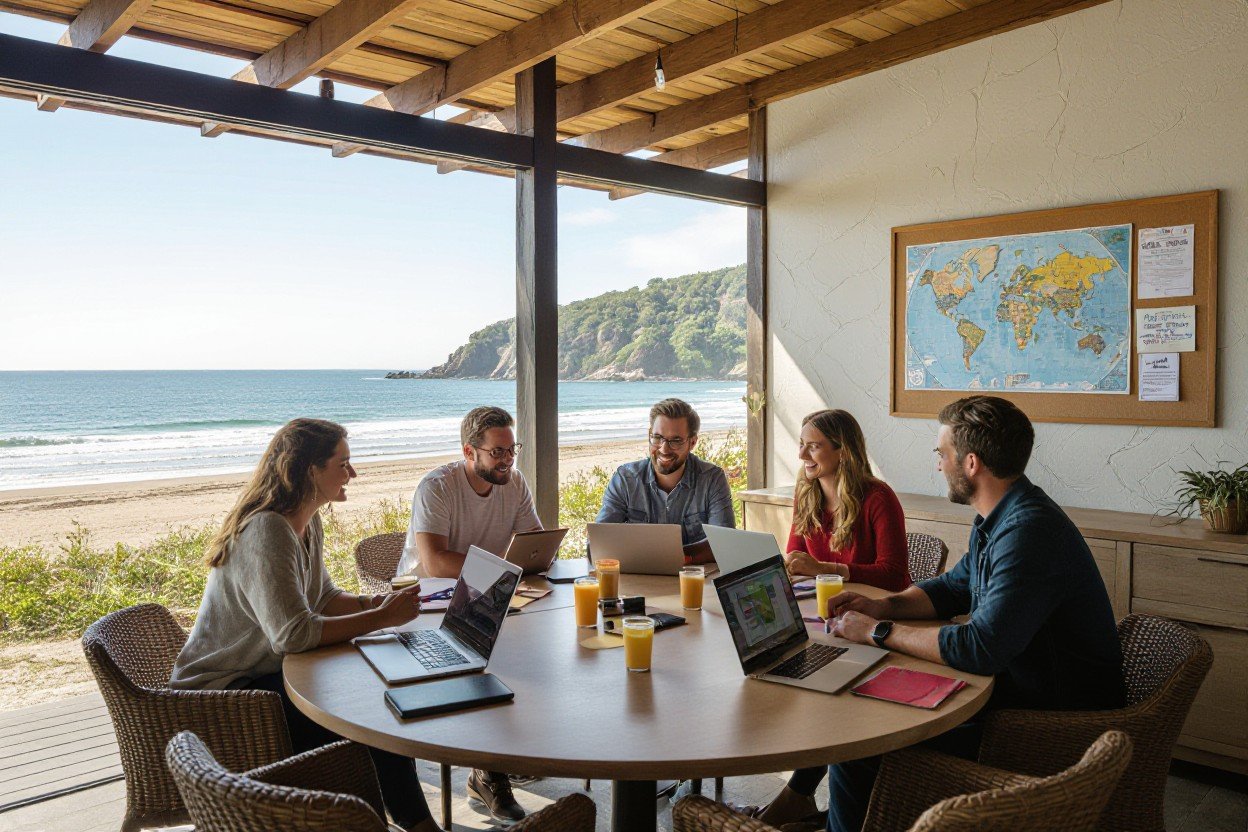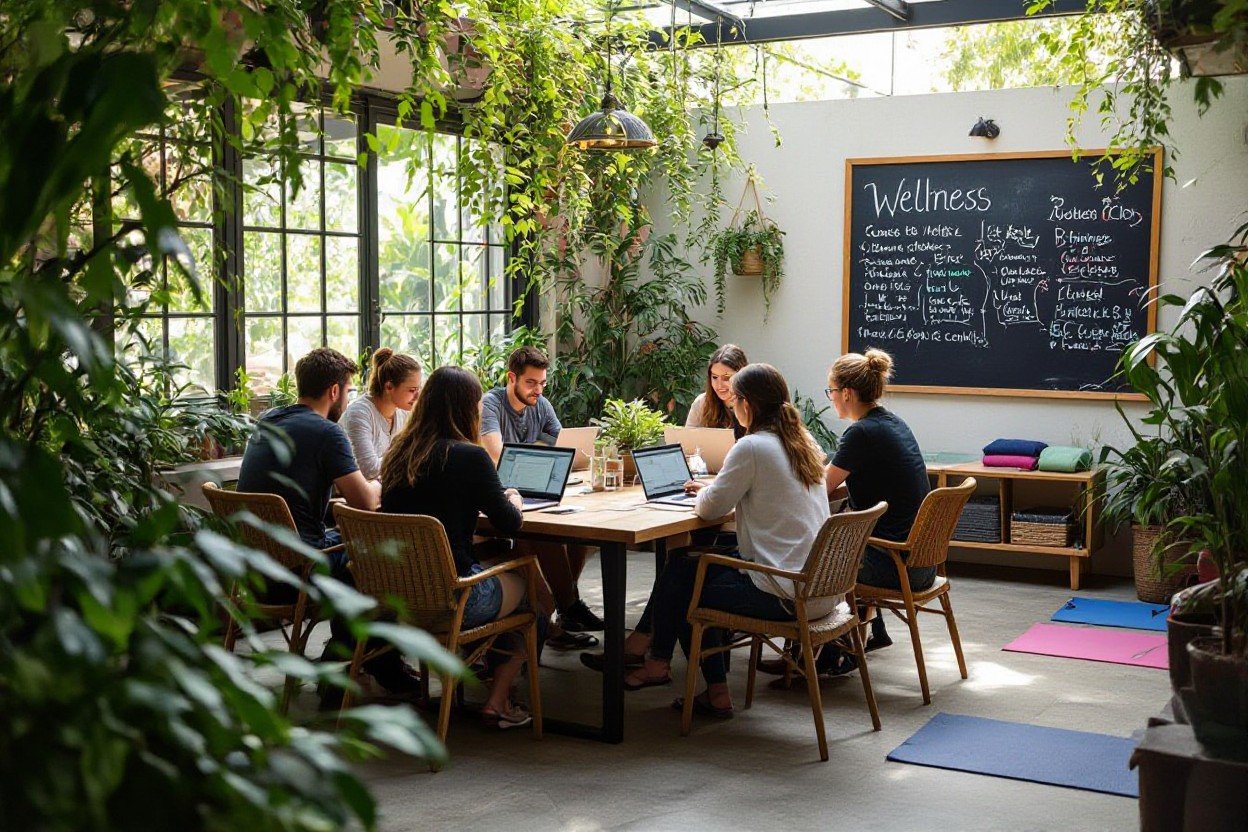Mental Health & Community Building for Digital Nomads
Many digital nomads face isolation and burnout as serious challenges that can harm your mental well-being. To combat this, engaging with local events, coworking spaces, and online communities becomes imperative for maintaining balance and connection. By building a supportive network, you not only reduce feelings of loneliness but also boost your productivity and overall happiness while working remotely. Understanding how to nurture your mental health through community involvement can transform your nomadic lifestyle into a more fulfilling and sustainable experience.
Key Takeaways:
- Engaging with local events helps digital nomads build meaningful connections and reduces feelings of isolation.
- Coworking spaces provide structured environments that encourage collaboration and enhance productivity while fostering community.
- Participating in online communities offers continuous support and networking opportunities beyond geographical boundaries.
The Unseen Battle: Isolation in the Digital Nomad Lifestyle
The Nature of Isolation in a Mobile World
Constantly moving from city to city may seem exhilarating, but it often comes with an underappreciated downside: isolation that arises despite being surrounded by new faces. Unlike traditional routines where community and social stability are embedded, digital nomads experience a fluid social environment where relationships remain transient and fleeting.
You might find that attending numerous events or coworking spaces doesn’t automatically translate into deep connections, as the rapid pace of change often limits opportunities for genuine bonding. Navigating this paradox means recognizing that physical presence doesn’t always combat the emotional distance formed by your mobile lifestyle.
Technology both alleviates and intensifies this isolation. While online communities provide platforms to connect with like-minded individuals, digital interactions sometimes lack the sensory feedback necessary for emotional fulfillment. You could be chatting daily in forums or Slack groups yet still face feelings of loneliness amid an invisible crowd. This mismatch between virtual engagement and real-world connection creates a unique kind of solitude, where you must intentionally seek moments that anchor you socially despite continuous relocations.
Psychological Consequences of Solitude
Extended periods of isolation can erode mental health in subtle but significant ways. Studies have linked chronic loneliness to increased stress levels, anxiety, and even cognitive decline over time. For digital nomads, this manifests as fluctuating motivation, dips in productivity, or a pervasive sense of disconnection that’s hard to shake. Many report difficulty distinguishing between being alone and feeling alone, which can trigger emotional fatigue and reduced resilience against daily challenges.
The psychological toll often extends beyond mood swings. Underneath, your brain might begin interpreting solitude as social threat, activating survival responses linked to hypervigilance and hormonal imbalances. This biological feedback loop can perpetuate feelings of burnout and exacerbate mental health conditions without obvious external causes. Regularly engaging with local events, coworking spaces, or virtual meetups acts not just as distraction but as an active intervention reducing these harmful neurological patterns.
Further research reveals isolation’s impact on your neurochemistry, showing lowered oxytocin levels—commonly known as the bonding hormone—when social contact is insufficient. Oxytocin influences not just emotional well-being but also your immune system and pain tolerance. Without adequate social nourishment, you may experience heightened physical and emotional vulnerabilities, underscoring why maintaining connections through deliberate community building strategies is more than just a quality-of-life improvement; it’s a health imperative.
Why Community Matters: Building Mental Resilience
Community acts as a foundational pillar for mental resilience, especially for digital nomads constantly navigating new environments and unpredictable schedules. Engaging with others in coworking spaces or local events anchors you to shared experiences, reducing the cognitive load of persistent uncertainty. Studies have shown that consistent social interaction triggers the release of oxytocin, which buffers stress hormones like cortisol—helping you maintain emotional balance during prolonged travel. A network of peers provides not only emotional support but practical advice on managing daily challenges, from finding reliable Wi-Fi to coping with time zone shifts.
In addition to emotional uplift, community connections foster a sense of belonging that counterbalances the fragmentary nature of a nomadic lifestyle. When facing unexpected hurdles like visa delays or work slowdowns, you gain immediate access to a support system that can offer solutions or simply a listening ear. This network effectively creates a safety net, allowing you to rebuild mental energy and bounce back faster from setbacks. In essence, community becomes a dynamic resource for you to draw upon, reinforcing your capacity to adapt and thrive while on the move.
The Power of Social Connections
Immersing yourself in local events or online groups creates opportunities to form authentic relationships that go beyond casual networking. These connections can evolve into friendships and mentorships, which provide emotional depth and diverse perspectives on work and life balance. Data from the Global Workplace Analytics indicates that workers who engage regularly with peers report up to 50% less loneliness, highlighting just how potent social ties are for mental wellness. For you, these relationships can translate into increased motivation and a sense of accountability that keeps burnout at bay.
Moreover, being part of a community exposes you to varying cultural norms and problem-solving approaches. This diversity challenges your assumptions and encourages cognitive flexibility, an vital skill for navigating the complexities of remote work. Joining coworking spaces or niche digital nomad meetups can expose you to individuals from dozens of countries, providing a rich tapestry of insights that sharpen your adaptability. Incorporating these social interactions into your routine enriches your emotional toolkit and creates a reservoir of support you can tap into during low periods.
Community as a Buffer Against Burnout
Burnout often sneaks up when you’re working in isolation, with blurred boundaries between work and rest. Being embedded in a community provides natural checkpoints where you can decompress and recalibrate. Engaging with others in shared environments like coworking spaces creates casual opportunities for breaks, spontaneous socializing, and healthy distraction—all of which interrupt the cycle of overwork. In communities where burnout is openly discussed, you gain access to strategies and resources that help you identify early warning signs and intervene before exhaustion sets in.
Regular interaction with peers also offers a mirror through which you can evaluate your own work patterns more objectively. When fellow members openly share their coping mechanisms or challenges, it normalizes struggles and reduces the stigma around seeking help. For you, belonging to such a community shifts burnout from a solitary experience to a collective concern, increasing the likelihood you’ll take proactive steps toward recovery. Collaborative spaces encourage a culture of accountability, where pacing yourself becomes part of the group ethos rather than an individual burden.
Exploring online community platforms dedicated to remote work or digital nomading can further enhance your resilience by connecting you to mentors and experts who offer targeted advice on managing workload and maintaining mental health. These digital networks often host webinars, discussion forums, and resource libraries that empower you to integrate wellness practices into your daily routine. Taking advantage of these community-curated resources supplements your in-person interactions and strengthens your overall defense against burnout’s pervasive effects.

Crafting Your Tribe: Finding Like-minded Souls
Building a network of like-minded individuals can be the strongest anchor against the ebb and flow of digital nomad isolation. Rather than drifting alone through every new city, connecting with others who share your interests and lifestyle preferences can transform transient encounters into lasting relationships. You can actively seek out communities whose passions align with yours—whether that’s sustainable living, coding marathons, or creative entrepreneurship—and find support that resonates on a deeper level than surface socializing.
Often, these connections come from leaning into existing ecosystems. Targeting specific groups—such as local expat communities or niche hobby clubs—allows you to carve out a social circle that understands the unique challenges and freedoms of your lifestyle. When you share not just space but values, you’re more likely to develop bonds that extend beyond casual meetups into meaningful collaboration and emotional relief.
Tapping into Local Events and Meetups
Local events are fertile ground for cultivating connections that feel both familiar and fresh. Cities around the globe now host regular meetups tailored to digital nomads, creatives, and tech professionals. Check platforms like Meetup.com, Eventbrite, or Facebook Groups to discover events ranging from skill workshops to language exchanges and cultural tours. These gatherings often feature anywhere from a dozen to several hundred participants, giving you the flexibility to find smaller, more intimate settings or larger networking opportunities depending on your social energy that day.
Participating consistently in these events accelerates your integration into the local scene and provides a dynamic setting to exchange knowledge and resources. Some nomads even attend recurring meetups to maintain a sense of community across locations—for example, tech-focused groups in Lisbon and Bali both boast thriving scenes with overlapping participants, reinforcing your global yet grounded tribe. Exchanging stories and practical advice during these meetups can effectively combat the isolation that comes from being geographically untethered.
Leveraging Coworking Spaces for Networking
You’ll find coworking spaces serve as everyday hubs for connection, collaboration, and combating burnout. Spaces like WeWork, Impact Hub, or local independent hubs often organize mixers, pitch nights, or skill-sharing sessions, weaving social opportunities into your workday. Physical proximity to other nomads and freelancers fosters serendipitous conversations that can spark creative partnerships or casual friendships, offsetting the monotony of solo remote work.
Many coworking spaces also offer membership tiers with access to digital community boards or exclusive events, meaning your networking doesn’t have to stop when you leave the physical space. This continuous loop of engagement creates a sense of belonging whether you’re on-site or dialing in from afar. In parts of Southeast Asia and Europe, some spaces even provide tailored wellness programs that prioritize mental health alongside productivity, recognizing the intertwined nature of both.
Beyond networking functions, coworking spaces often become informal support systems where you can exchange resources like accommodation tips, travel hacks, or mental health strategies. Spaces such as The Hive in Bangkok report that over 70% of their members find lasting mentorships through their community activities, highlighting the significant impact these environments have beyond just a desk and Wi-Fi.

The Digital Bridge: Online Communities and Support Networks
Expanding your social horizon beyond physical spaces, online communities form a vital lifeline to combat the solitude that often shadows digital nomadism. These platforms connect you to a vast network of peers who share not only your experiences but your struggles and aspirations. Across forums, niche groups, and dedicated apps, you can find targeted support tailored to specific challenges such as work-life balance, mental health, or local recommendations wherever you land next. Engaging deeply in these communities often transforms isolated moments into opportunities for meaningful collaboration and empathy, which can markedly reduce burnout.
Several studies underscore the tangible benefits of such involvement. According to a 2023 survey by Remote Work Insights, digital nomads who participate in at least one online community report feeling 42% less isolated and 35% more motivated than those who do not. This suggests that digital bridges—those virtual spaces where you can share and learn—play a measurable role in sustaining your mental well-being amid the constant transitions of a nomadic lifestyle.
Engaging with Virtual Co-Working Groups
Virtual co-working groups have emerged as a dynamic solution to the lack of shared physical workspace, offering both structured work sessions and casual social interactions. Platforms like Focusmate or Caveday simulate the ethos of real coworking spaces by pairing you with accountability partners to increase productivity while also encouraging breaks and social check-ins. These groups often host workshops, networking sessions, and social hours that replicate the vital community feel you get from traditional coworking environments.
Participating regularly leverages the psychological benefits of social presence, mitigating feelings of isolation and heightening your focus. For example, users of Focusmate report a 25% increase in daily task completion on average. Getting into a rhythm with fellow nomads who share your working hours and challenges can create a sense of routine and belonging, offsetting the unpredictability inherent in the digital nomader’s schedule.
Utilizing Social Media Platforms for Connection
You can tap into various social media channels where digital nomads congregate to exchange tips, local event updates, and emotional support. Facebook groups like “Digital Nomads Around the World” and Instagram communities tagged with #nomadlife foster active conversations and resource sharing, helping you stay informed and connected regardless of your location. Twitter chats and LinkedIn forums also serve as professional hubs where you can discuss industry trends while keeping your social network vibrant.
Social media’s advantage lies in its accessibility and diversity of content. Live streams, AMAs (Ask Me Anything), and virtual meetups often hosted within these spaces allow you to engage in real-time, breaking down geographic and temporal barriers that can otherwise amplify loneliness. Many digital nomads use these channels to organize spontaneous meetups or collaborative projects that reinforce both personal and professional ties.
Moreover, social media algorithms increasingly prioritize community-centered content, helping you discover potential connections aligned with your interests and goals faster. Harnessing this can create a positive feedback loop of interaction and support, which is a powerful counteragent against the mental fatigue and isolation of long-term remote work.

Strategies for Sustainable Mental Well-Being
Incorporating Mindfulness and Routine
Integrating mindfulness practices into your daily life can serve as a powerful anchor amidst the unpredictable flow of a digital nomad lifestyle. Techniques like daily meditation, focused breathing exercises, or even brief moments dedicated to sensory awareness have been shown to reduce stress hormones and improve emotional regulation. For instance, practitioners who engage in as little as 10 minutes of mindfulness meditation per day report significant reductions in anxiety and increased resilience to overstimulation from travel-related challenges.
Establishing a consistent routine further supports your mental well-being by creating pockets of predictability in the midst of constant change. You might consider setting regular work hours aligned with your most productive times or implementing simple rituals such as morning stretches or a set bedtime. These habits help regulate your circadian rhythm and foster a sense of control, which counters feelings of burnout commonly amplified by irregular schedules and frequent timezone shifts.
Setting Boundaries in Community Interactions
Engaging with coworking spaces, local events, and online communities expands your network and eases isolation, but without clear boundaries, it can also lead to burnout or emotional fatigue. Defining your availability, both online and offline, helps maintain your energy levels. For example, allocating specific times to respond to messages or participate in social gatherings prevents overextension. Many digital nomads who have adopted “communication windows” report improved focus, less distraction, and greater enjoyment during community interactions.
Learning to say no or gracefully detach from activities that don’t align with your current needs proves equally important. Overcommitting often arises from the desire to maximize connection opportunities, yet it risks leaving you overwhelmed. Implementing explicit limits around how much social engagement you accept enables you to recharge and return to your community with genuine enthusiasm and presence, enhancing both your mental health and the quality of your relationships.
Setting boundaries also involves recognizing when certain community dynamics may be draining or counterproductive. For example, overly competitive coworking environments or persistent digital chatter beyond your comfort zone can subtly chip away at your well-being. By monitoring your emotional responses and adjusting your involvement accordingly, you preserve your mental resources and foster interactions that feel supportive rather than obligatory.
Summing up
Hence, maintaining your mental health as a digital nomad involves actively seeking opportunities to connect with others and create a supportive community. Joining local events, utilizing coworking spaces, and engaging in online communities are effective ways to reduce isolation and prevent burnout. These interactions not only offer social support but also provide a sense of belonging, which can significantly enhance your overall well-being while navigating the challenges of a mobile lifestyle.
By prioritizing community building alongside your professional goals, you foster an environment where your mental health can thrive. Embracing these connections helps you balance work and personal life, enabling you to sustain productivity and satisfaction wherever your journey takes you. Ultimately, your commitment to cultivating relationships and support networks will empower you to enjoy the digital nomad experience more fully and sustainably.
FAQ
Q: How can digital nomads overcome feelings of isolation while working remotely?
A: Digital nomads can reduce isolation by actively engaging with local events, joining coworking spaces, and participating in online communities that align with their interests or profession. These opportunities create avenues for social interaction, collaboration, and support, which help build connections and lessen the sense of being alone.
Q: What role do coworking spaces play in supporting mental health for remote workers?
A: Coworking spaces offer more than just a place to work; they provide a social environment where individuals can meet like-minded people, share ideas, and develop friendships. This social interaction can improve motivation, reduce stress, and contribute to better mental well-being by creating a sense of belonging and community.
Q: How can online communities help digital nomads manage burnout?
A: Online communities help digital nomads manage burnout by offering platforms to share experiences, seek advice, and access resources related to work-life balance and self-care. Being part of these groups allows members to find encouragement and practical tips from peers who understand the unique challenges of remote work, fostering resilience and emotional support.


Comments
Leave a Comment